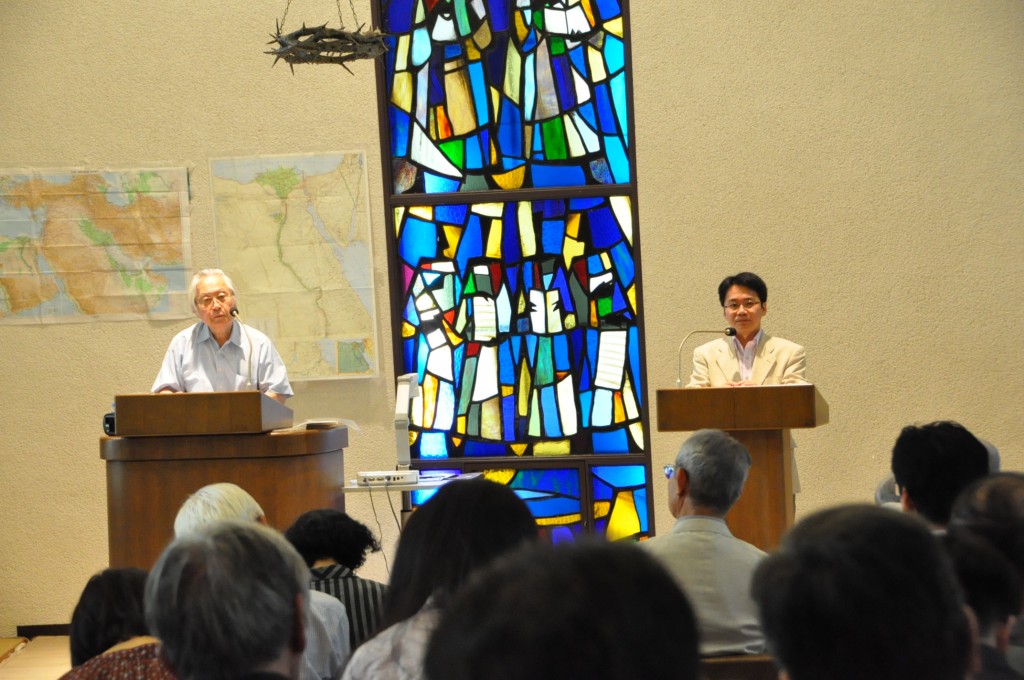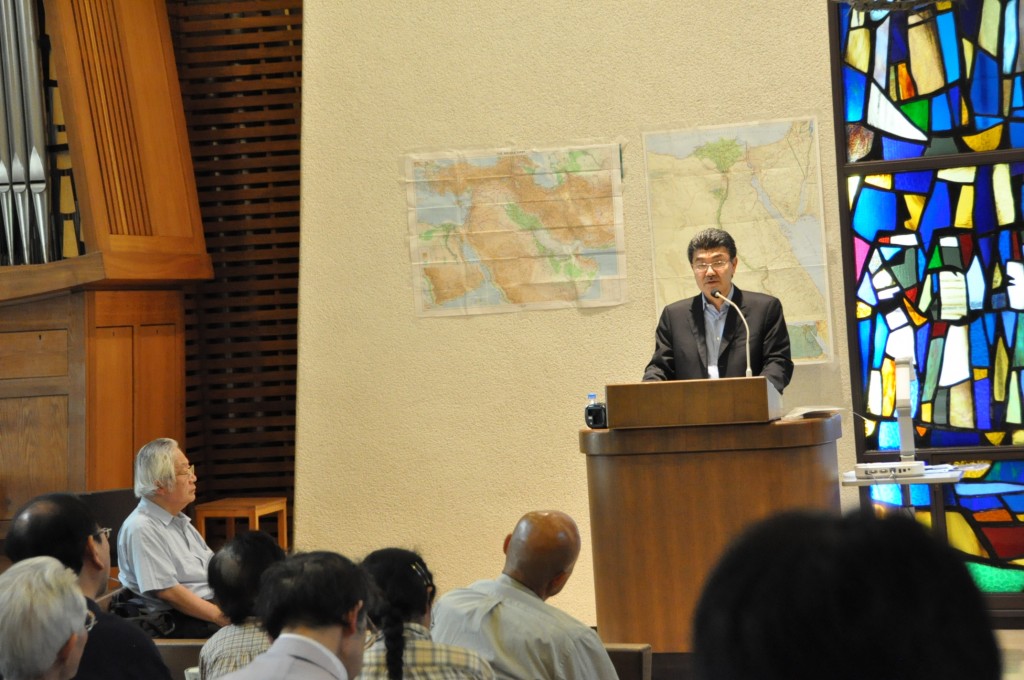Center for Interdisciplinary Study of Monotheistic Religions(CISMOR)Doshisha University
> Public Lectures > For the Purpose of Realizing True Peace – Comparative Study between the Flight of the Holy Family to Egypt as told by the Copt and the Islamic Hegira-Public Lectures
Public Leture
For the Purpose of Realizing True Peace – Comparative Study between the Flight of the Holy Family to Egypt as told by the Copt and the Islamic Hegira-
| Date: |
2013/06/08 13:00-15:00 |
|---|---|
| Place: | Divinity Hall Chapel, Imadegawa Campus, Doshisha University |
| Lecture: |
Prof. Munehiko Kuyama (Visiting Professor, Department of Japanese Language and Literature,Faculty of Arts, Cairo University, Egypt) |
| Summary: | |
|
Dr. Munehiko Kuyama is Visiting Professor at the Department of Japanese Language and Literature, Faculty of Arts, Cairo University. His past positions include Professor of Hosei University and President of Caritas Junior College. In this presentation, he argued that the culture of Egypt has a monotheistic nature, whether Christian or Islamic, while Japan has polytheistic culture, which has enabled the Japanese to maintain the culture of harmony with diversity behind it. Due to such cultural differences, Egypt and Japan differ in their ways of thinking. Therefore, deepening understanding of each other’s culture can be beneficial to both nations. The Egyptian people have a pressing need to address the question of how to build a new society amid the uncertainty following the recent revolution. Against this backdrop, the Japanese culture that respects harmony in building human relations strikes Egyptian students at Department of Japanese Language and Literature as inspiring. Today, Islam is the dominant religion of Egypt, while Coptic Christianity is also embraced by about ten percent of the population. Egyptian society places special importance on tradition, and their religious culture has developed through three stages. The first stage was during the time of pharaohs, which was followed by the second stage when Coptic Christianity spread throughout Egypt. The flight of the Holy Family – Jesus, Mary, and Joseph –and Jesus’ nurse, Salome, to Egypt sowed the seeds of Christian faith among Egyptians, and the mission of Saint Mark in later years made Alexandria a center of Coptic faith. In the seventh century, Islam was introduced to Egypt and became the dominant religion of this country. The flight of the Holy Family to take refuge in Egypt is a highly significant event for Coptic Christianity. To escape King Herod’s massacre of the innocents to kill Jesus, the Holy Family traveled throughout Egypt for three and half years. According to Professor Kuyama, the journey of the Holy Family to Egypt can be seen by Muslims as comparable to the Hijra, or the journey of the Prophet Muhammad and his followers from Mecca to Medina to escape persecution. The year 622 when the Hijra occurred was designated the first year of the Islamic calendar. Both journeys were guided by God and both the Holy Family and Muhammad resolutely resisted the urge to fight back and beat their enemies and instead opted to forgive them, thus maintaining a peaceful, thoroughly non-confrontational attitude. This is in sharp contrast to some political leaders who are apt to settle problems by proactively attacking and eliminating “evil” enemies or in other words, by fighting enemies in the same manner as the enemies do. In the opinion of Professor Kuyama, the flight of the Holy Family to Egypt and the Hijra provide us with a hint to explore how we can take the first step toward true peace. While the “eye for an eye” attitude prevails in today’s society, this attitude is entirely incompatible with the doctrine of Christianity, namely the teaching of Jesus to forgive and love your enemies, a principle at the core of Coptic Christianity. In Egypt, Islam and Coptic Christianity are widely recognized as a united force. In the last revolution, for example, Muslims and Coptic Christians jointly participated in protest demonstrations holding the Qur’an and crosses above their heads. When Muslims offered prayer during demonstrations, Coptic Christians formed human walls around them to ensure the prayer would not be interrupted. Some posters have the design of the cross combined with the crescent to emphasize the image of one united Egypt. Professor Kuyama concluded the presentation by stressing the importance of turning to psychological flight when attacked by enemies; namely using psychological weapons to control our internal urge to fight back, instead of resisting and fighting enemies by force of arms just as the enemies do. (Norimasa Fujimoto, Research Assistant, Graduate Student of School of Theology, Doshisha University) |
|
|
*This lecure will be conducted in Japanese only. *Admission Free, No Reservation Necessary. Hosted by CISMOR Co-hosted by School of Theology, Doshisha University |
|

